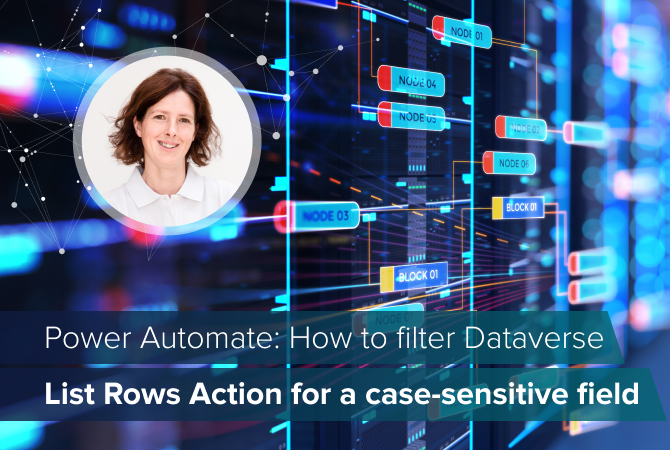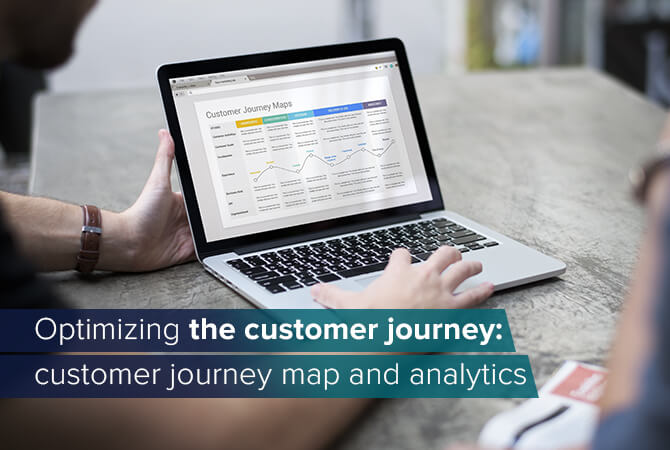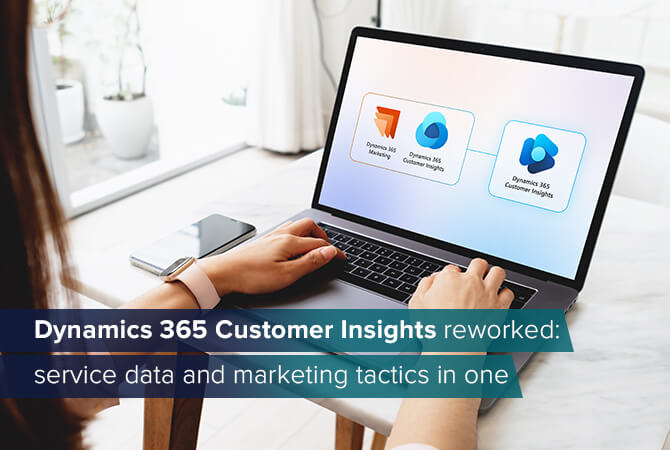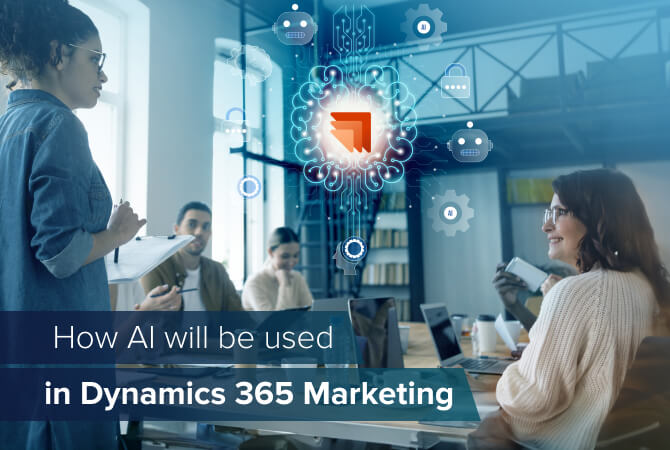
How AI will be used in Dynamics 365 Marketing
Content
Navigating the marketing landscape without an automated system, especially one harnessing Artificial Intelligence (AI), is akin to sailing through turbulent waters without a compass. Businesses facing this scenario encounter a multitude of challenges. Firstly, manual data collection and analysis consume excessive time and resources, leading to delays in decision-making. Without AI-powered insights, marketers are left in the dark about consumer behaviors and preferences, resulting in generic, one-size-fits-all campaigns ill-suited for today’s data-driven business environment.
Moreover, the absence of automation severely limits the scalability of marketing efforts, impeding expansion and growth. Manually segmenting customers, a vital aspect of personalized marketing, becomes a Herculean task prone to errors. This lack of agility to adapt to real-time market changes can lead to missed opportunities and hinder competitiveness. Essentially, without automated systems, businesses grapple with inefficiency, ineffectiveness, and untapped potential in their marketing endeavors, making AI integration a necessity rather than an option in today’s fast-paced digital marketplace.
Dynamics 365 Marketing offers a transformative solution by enabling businesses to engage with prospects and customers individually and at scale, providing timely and personalized content. In this article, we will explore how AI is poised to revolutionize Dynamics 365 Marketing, giving businesses a competitive edge in the ever-evolving marketing landscape.
Artificial Intelligence and its key components
Artificial Intelligence is rapidly revolutionizing the landscape of marketing across global businesses, and when harnessed within Dynamics 365 Marketing, it becomes a powerful ally for creating not only effective but more efficient marketing campaigns.
To comprehend the impact of AI on Dynamics 365 Marketing, it is essential to grasp the fundamentals of AI and its key components, which encompass artificial intelligence, machine learning, and automation.
Within Dynamics 365 Marketing, this intelligence manifests in various forms. Imagine an AI-driven predictive analytics model that sifts through vast datasets to identify patterns in customer behavior. For instance, it can discern that customers who make a purchase within a week of signing up are more likely to become long-term clients. This insight allows marketers to prioritize these leads and tailor campaigns to nurture this specific segment.
Historical customer data to make predictions, Machine learning can analyze past purchase histories and patterns to predict which products a customer might be interested in next. This can empower retailers or ecommerce store owners to recommend better marketing strategies for complementary items or offer personalized discounts, significantly enhancing the customer experience.
Now picture this: an AI-driven chatbot on your website. It can engage with visitors, answer queries, and even recommend products or services based on the user’s behavior. Automation can literally enhance conversion rate of your business, letting you profit at scalable horizon.
These elements collectively empower marketers to harness the full potential of AI for optimizing their campaigns.
How AI has transformed traditional marketing
AI has ushered in a profound transformation in traditional marketing practices. It’s akin to turning on a powerful spotlight in a dimly lit room. Where marketers once relied on educated guesses and historical data, AI now empowers them with predictive analytics, real-time insights, and hyper-personalization. This shift has redefined how brands connect with their audience, optimizing everything from content creation to customer targeting. AI-driven algorithms continuously analyze vast datasets, enabling marketers to make data-driven decisions swiftly. In essence, AI has evolved marketing from a hit-or-miss endeavor into a finely tuned, data-powered strategy that not only reaches consumers but resonates with them on an individual level, fostering brand loyalty and driving exceptional results.
Workflow automation for efficiency with AI
AI has supercharged marketing efforts by introducing workflow automation, leading to improved efficiency. With AI, marketers can automate routine tasks, such as sending email campaigns and creating landing pages, freeing up valuable time for strategic planning and creativity.
Rather than spending hours which even are not productive in their outcomes, marketing teams are getting smarter. Mundane tasks like scheduling and sending emails are handled effortlessly by AI-driven automation. Marketers can focus on devising ingenious campaigns, analyzing critical data, and nurturing customer relationships.
AI features for personalized customer journeys and segmentation
One of AI’s remarkable features within Dynamics 365 Marketing is its ability to provide real-time marketing insights. This capability enables businesses to make data-driven decisions promptly. AI analyzes customer data to create personalized customer journeys and segments, ensuring that the right message reaches the right audience at the right time. This level of personalization significantly enhances engagement and conversion rates.
For example, a travel website using Dynamics 365 Marketing and AI. As a user browses the site, AI analyzes their interactions – like destinations clicked and travel dates entered – in real-time. If the AI detects an interest in beach vacations, the site immediately showcases beach destinations, special offers, and activities in those locations. Conversely, if another user explores city getaways, the AI tailors the website to emphasize urban destinations, cultural experiences, and relevant travel deals. This swift personalization ensures users receive content and options that align with their interests, leading to greater engagement and booking conversions.
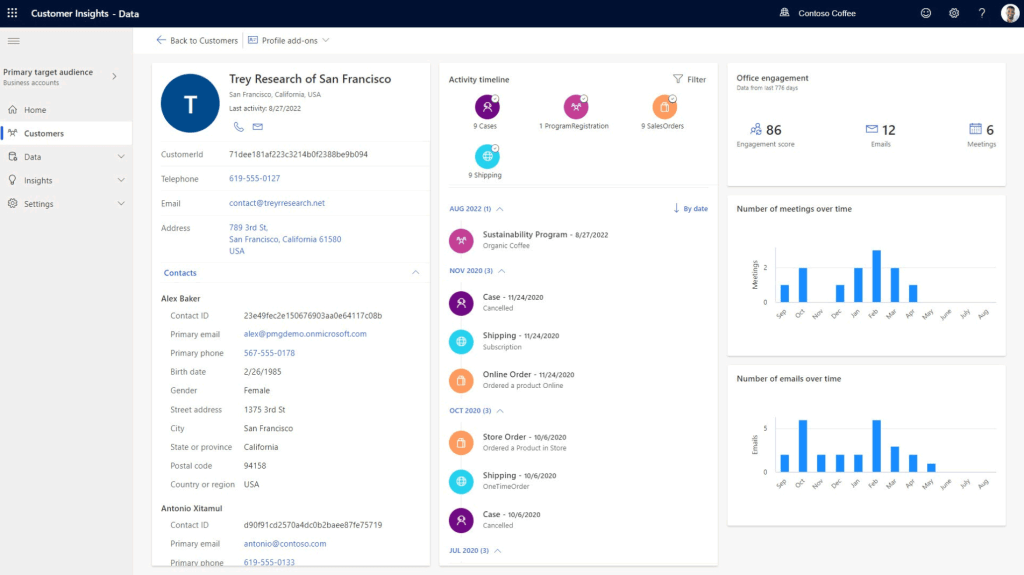
How lead scoring and conversion optimization analytics are driven by AI
AI’s impact extends to lead management, where it plays a pivotal role in lead scoring and conversion optimization. AI algorithms evaluate lead data, helping marketers prioritize and focus their efforts on leads with the highest likelihood of conversion. This not only saves time but also boosts the effectiveness of marketing initiatives.
For instance, if a lead regularly engages with your content, attends webinars, and downloads product brochures, AI recognizes this pattern as indicative of a hot prospect. It assigns a higher lead score to such a lead, signaling to your marketing team that this individual is ripe for personalized engagement. In this way, AI not only streamlines lead management but also significantly increases the chances of converting leads into satisfied customers.
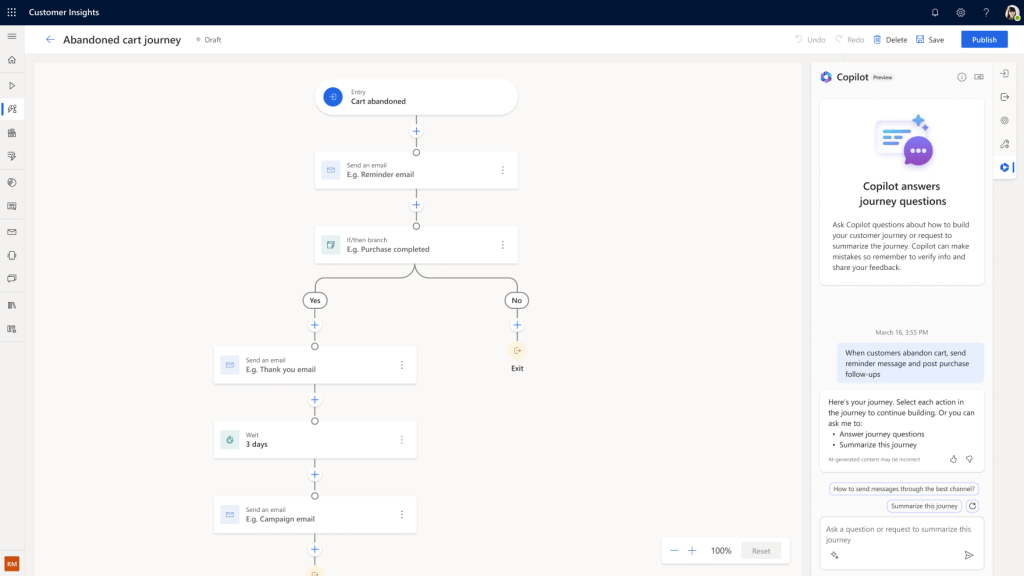
How AI analyzes content performance and suggests optimizations to improve engagement
AI also enhances content marketing efforts. It meticulously analyzes content performance, offering suggestions for optimization to improve engagement. Marketers can fine-tune their content based on AI-driven recommendations, ensuring that every piece of content resonates with the target audience.
AI can do wonders, from assessing which headlines resonate best with your audience to identifying the most effective posting times. It can even suggest the ideal length for blog posts or recommend relevant keywords for better SEO. This multifaceted analysis ensures that your content strategy is finely tuned for maximum engagement and impact.
How AI improves attendee engagement and overall event experience
For businesses engaged in event management, Dynamics 365 Marketing’s AI capabilities provide a significant advantage. AI improves attendee engagement and enhances the overall event experience. It offers insights into event performance, enabling organizers to make on-the-fly adjustments to maximize impact.
Imagine a company hosting a product launch event, during the event AI algorithms analyze attendee interactions with different product displays and demos. If it detects that a particular product or demo is drawing significant attention and engagement, event organizers can swiftly allocate more resources and time to that area, ensuring attendees get the in-depth information they desire, maximizing the event’s impact, leading to a more successful product launch.
With different event elements, AI can track attendee interactions, analyze real-time data to identify trends, and provide event organizers with actionable insights.
How companies have used AI to improve their marketing campaigns
Numerous companies have harnessed AI within Dynamics 365 Marketing to revamp their marketing campaigns. These real-world success stories showcase how AI-driven strategies have led to increased efficiency, higher conversion rates, and improved customer satisfaction. From personalized email marketing to data-driven decision-making, AI has emerged as the cornerstone of modern marketing.
Here are a few real-world examples of how companies have used AI to improve their marketing campaigns:
- Netflix. Netflix uses AI to personalize its recommendations for each user, based on their viewing history and preferences. This has helped the company to increase engagement and reduce churn.
- Amazon. Amazon uses AI to power its product search and recommendation engine. This helps customers to find the products they are looking for more easily, and it also helps Amazon to increase sales.
- Nike. Nike uses AI to personalize its marketing messages and product recommendations for each customer. This helps the company to increase sales and build stronger customer relationships.
- HP. HP employed AI-driven lead scoring to pinpoint promising prospects by assessing historical data and online interactions, enabling them to concentrate sales efforts effectively.
Major AI changes in Dynamics 365 Marketing and an expanded Marketing universe
Conclusively, Dynamics 365 Marketing with its AI capabilities is poised to transform the marketing landscape in almost every vertical across the globe. It empowers businesses to create highly targeted and personalized campaigns, automate routine tasks, and gain real-time insights for data-driven decisions. As AI continues to evolve, its integration with marketing platforms like Dynamics 365 Marketing opens new horizons, allowing marketers to navigate the complex marketing landscape with confidence and creativity.
Incorporating AI into Dynamics 365 Marketing is not just a technological upgrade; it is a strategic move that can redefine your marketing success in the digital age. As businesses increasingly rely on AI-driven marketing solutions, embracing this technology becomes imperative for staying competitive and achieving marketing excellence in today’s dynamic business environment.

